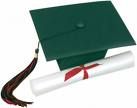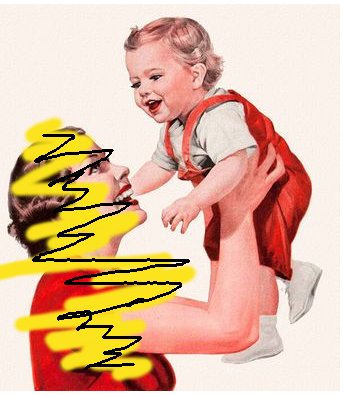 Oooooh...! Halloween’s coming up. A reader asked me to come up with ideas for spooky mystery novels. The writer herself suggested Diane Setterfield’s The Thirteenth Tale. Good one!
Oooooh...! Halloween’s coming up. A reader asked me to come up with ideas for spooky mystery novels. The writer herself suggested Diane Setterfield’s The Thirteenth Tale. Good one!
Here are some I came up with—mostly older works:
- Rebecca by Daphne Du Maurier, 1938 (an all-time favorite)
- Jane Eyre by Charlotte Bronte, 1847 (the mad women in the attic)
- The Woman in White by Wilkie Collins, 1859-60 (scrumptious)
- The Hound of the Baskervilles by Conan Doyle, 1091-02 (the great Sherlock and Watson)
- Twilight by Stephanie Meyer, 2003 (we have guides for the complete vampire series)
- Anything scary by Stephen King… Any particular suggestions from anyone?
If anyone has some other ideas, let us know. We’d love to hear from you.
 Ah, poor me...I just returned from Italy. Life is so hard.
Ah, poor me...I just returned from Italy. Life is so hard.
While there...I was reading Sarah Dunant’s The Birth of Venus—which I’d just happend to pick off the bookshelf at the house where I was staying. And here’s what happened…
Dumb me. I left my purse on the Florence Hop-On-Hop-Off tour bus, which takes you around the city. Had to sprint—shoes off—through a piazza to head it off at the next stop. No mean feet, so to speak (not so young…nor so thin). But happy ending. Got the bus, got the purse.
Here’s the cool part: the piazza I cut through was in front of the Basilica di Santa Croce—the very place, in the book, where Savanarola banned women from public life (i.e., those running barefoot around town). And I’d just read that chapter of the book the night before. Ah literature...ah, life!
Anyway, my trip was slightly different from Liz Gilbert’s…my version was Eat, Run, Eat. Just as much fun...but no book, no movie.
 A book club member emailed me the other day to say she found a certain book's Discussion Questions just TOO HARD. So I took a look. She was right—you need a Ph.D. to answer them...in fact, a whole damn village of Ph.Ds.
A book club member emailed me the other day to say she found a certain book's Discussion Questions just TOO HARD. So I took a look. She was right—you need a Ph.D. to answer them...in fact, a whole damn village of Ph.Ds.
What to do? Well, I decided to replace the publisher-issued questions with my own set and sent them off to her. Fortunately, that seemed to do the trick.
The whole incident brings up a point—a book's Discussions Questions can feel more like a pop quiz than a discussion starter for book clubs. They're often more threatening than helpful.
So...what do you do if you want a good discussion? Try taking a look at our other LitLovers Discussion Resources. While they're not specific to a particular title, they can help you get to the meat of a book—either fiction or nonfiction. They're more helpful than scary.
Discussion help from LitLovers
- How to Discuss a Book
- Generic Disucssion Questions for Fiction and for Nonfiction
- Read-Think-Talk (a guided reading chart)
- LitCourse—our 10 free courses are short and fun
 Warning: if you ever find yourself in the position of being a fictional mom, look out—there's a risk you'll get BUMPED OFF.
Warning: if you ever find yourself in the position of being a fictional mom, look out—there's a risk you'll get BUMPED OFF.
It could happen during the course of your novel… or even BEFORE the novel even begins.
Here's why: the author may have destined your daughter for a great literary adventure; maybe she's slated to become one of literature's most renowned heroines. If that's the case, SORRY, MOM, you've gotta go.
Literature's spunkiest, most independent HEROINES—the ones we admire and remember most fondly?—they're motherless:
Moll Flanders (1721)
Fanny Hill (1749)
Emma (1815)
Jane Eyre (1847)
Rebecca of Sunnybrook Farm (1903)
Nancy Drew (1930…)
Rebecca (Daphne du Maurier) 1938
More recently, we've been graced with the heroines of Ahab’s Wife and Amy Bloom’s Away, both of whose mothers die.
What's wrong with mothers? Well, traditionally, a mother's role has been to instill proper behavior — to correct for waywardness — especially in their DAUGHTERS. And mothers are fierce protectors of their offspring, keeping them out of harm's way.
Yet literature's greatest heroines are placed squarely in the path of HARM'S WAY, right where their authors want them—but where any mom worth her salt doesn't. So a character who would restrain improper or dangerous behavior must be GOTTEN RID OF. Dumped. That would be a mother.
Today, most moms aren't so old-fashioned. We want our girls to enjoy a WEALTH of human experience — education, career, and travel, as well as family life. Even so, I'm not so sure many of us would want our girls sneaking aboard a whaling ship, let alone working in a brothel like Moll Flanders — which means an author would have to WRITE US OUT of the storyline. Oh, well…
Don't miss these later LitBlog posts on getting rid of literary moms:
#MomsAreMad About Books
Where is My Mother?
Ideas for book clubs
- Think of other books featuring independent heroines in which mothers are done away or are simply never present.
- Think of books with father-and-son or father-and-daughter adventures.
- Prove my theory wrong: come up with some mother-daughter adventure stories.(Okay… Little Women. Any others?)
 I’ve plowed through a pile of books lately and thought it would be fun to share some thoughts with you.
I’ve plowed through a pile of books lately and thought it would be fun to share some thoughts with you.
The Lay of the Land (Richard Ford): This book spends 600 pages following a middle-aged guy through 3 days of his life. The math’s easy. . .200 pages per day and not much happens. But I adore this book. The writing is simply brilliant: funny, wry, and filled with provocative, even life-altering insights.
The Sign for Drowning (Rachel Stolzman): a beautiful, slender  novel about the Deaf commnity, written with elegance and compassion. I loved it, especially because it’s a debut novel!
novel about the Deaf commnity, written with elegance and compassion. I loved it, especially because it’s a debut novel!
 The Ten Year Nap (Meg Wolitzer): Right from the opening paragraph, you know you’re in good hands. Here's how she writes about the morning sounds waking women up all over the country:
The Ten Year Nap (Meg Wolitzer): Right from the opening paragraph, you know you’re in good hands. Here's how she writes about the morning sounds waking women up all over the country:
There were wind chimes and roaring surf, and the electronic approximation of birdsong and other gentle animal noises. All of it accompanied the passage of time, sliding forward in liquid crystal. Almost everything in these women’s homes required a plug.
That last line is priceless—funny and knowing. The women in this novel are all plugged in and nowhere to go.
Winter in Madrid (C.J. Sansom): a huge best-seller coming from Britain. I had high hopes. . . but it’s melodramatic to the max. Things like “tears pricked” (his eyes, or at the corners of his eyes) get used 4 times within the first 60-some pages. In fact, lots of tears get shed by lots of characters. Also, this: She…ran the comb through her thick auburn hair. It flowed in waves.” Or this: “Her heart was starting to thump with excitement.” Okay, truthfully, it gets better. Still, where’s Graham Green when you need him. . .or Robert Ludlum?
I had high hopes. . . but it’s melodramatic to the max. Things like “tears pricked” (his eyes, or at the corners of his eyes) get used 4 times within the first 60-some pages. In fact, lots of tears get shed by lots of characters. Also, this: She…ran the comb through her thick auburn hair. It flowed in waves.” Or this: “Her heart was starting to thump with excitement.” Okay, truthfully, it gets better. Still, where’s Graham Green when you need him. . .or Robert Ludlum?
 The Known World (Edward P. Jones): I’m late coming to this powerful book, about slavery, especially African Americans who owned slaves. Morally complex and wonderfully written. Jones won the Pulitzer in 2004.
The Known World (Edward P. Jones): I’m late coming to this powerful book, about slavery, especially African Americans who owned slaves. Morally complex and wonderfully written. Jones won the Pulitzer in 2004.
The Story of Edgar Sawtelle (David Wroblewski): You’ve got to love dogs and Hamlet, and I do. Dense, digressive (especially about the genetics of dog breeding), brooding and, yes, tragic (it is, after all, a retelling of Hamlet). But this is a gorgeous, satisfying read. I love this book. So does Oprah (we’re so much a like).
Hamlet). But this is a gorgeous, satisfying read. I love this book. So does Oprah (we’re so much a like).
